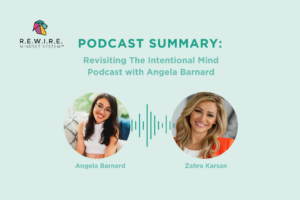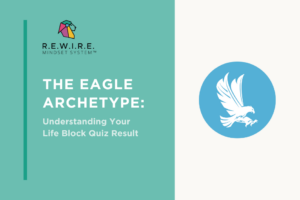In the pursuit of love, wealth, and lasting happiness, many of us find ourselves facing invisible barriers.
These barriers often spawn from habits and thought patterns that we may not even be aware of.
Ready to explore how you can rewire your mind for a more fulfilling and prosperous existence?
Let’s go.
1. The Power of Self-Talk
First thing’s first: your inner dialogue plays a pivotal role in shaping your reality.
Research now proves that the way we talk to ourselves has the power to either inspire action or drive us down a path of depression, anxiety, and self-sabotage.
Positive psychology emphasizes the importance of cultivating optimistic self-talk to foster a healthier mindset. Neurohacks, or cognitive techniques rooted in neuroscience, support this notion by highlighting the brain’s plasticity—its ability to rewire and adapt.
To rewire your mind for positivity, start by becoming aware of your self-talk.
Challenge and replace negative thoughts with affirmations that reflect your ultimate goals. Remember: you can’t erase, you must replace.
Instead of dwelling on your financial worries this week, affirm your wealth-building potential the next time you’re tempted to open your bank account and spiral. Shift your energy away from affirming your fear, and direct that energy towards actions that will result in positive change.
Over time, this practice can reshape your neural pathways, reinforcing a mindset conducive to prosperity!
2. Breaking the Cycle of Fear
Imagine for a moment a flat portion of land. Over the years, rain, floods, hikers, animal footprints, earthquakes, and weather patterns start to wear away the flat ground, forming grooves, paths, and even small canyons.
Your brain works exactly the same way.
As we move through life, our experiences start to create ‘pathways’ in the landscape of our brain, allowing us to prepare for (and anticipate) the future.
The only problem is, if those brain pathways have been built out of fear or trauma, they can’t always be trusted to take us where we need to go.
Fear is a powerful emotion that can paralyze us, preventing us from seizing opportunities, saying how we feel, and pursuing our big dreams.
Neuroscience suggests that fear activates the amygdala, the brain’s fear center, triggering the release of stress hormones.
On the flip side, positive psychology teaches us that cultivating courage and facing our fears head-on can create new neural connections, or pathways, associated with resilience and strength.
To overcome fear, break it down into manageable steps. Gradually expose yourself to the source of anxiety, whether it’s public speaking, spending money on yourself, or telling someone you love how you really feel.
Neuro hacks for happiness encourage us to associate positive emotions with these challenges, rewiring the brain to perceive them as opportunities for growth rather than threats.
3. Letting Go of Perfectionism
Perfectionism, while usually seen as a virtue, can be a hidden obstacle to happiness and success for many of us.
Psychologically, the pursuit of perfection is linked to anxiety and low self-esteem.
Neuroscientifically, the brain’s reward center, the nucleus accumbens, can become overactive, making it difficult to find satisfaction in achievements.
To help yourself loosen the grip of perfectionism, embrace the concept of positive imperfection—striving for excellence while understanding that perfection is unattainable.
Neuro hacks for happiness involve celebrating progress rather than fixating on flaws. By releasing the need for perfection, you allow yourself the freedom to enjoy the journey toward your goals.
4. Rewiring Your Relationship with Failure
Failure is an inevitable part of any journey. Still, if you’re like most humans, you might still view it as a personal shortcoming rather than a stepping stone to success.
Neuroscientifically, failure can activate the brain’s default mode network (DMT for short), associated with self-reflection and rumination. However, positive psychology would invite you to reframe shame and failure as a valuable learning experience.
To rewire your mind for resilience, cultivate a growth mindset.
Sounds easier said than done, right? Here’s a good starting point: take a free personality quiz to help you pinpoint your areas of strength, and areas where you’re hard on yourself.
The Life Block Quiz is a great FREE resource that unpacks our conscious and unconscious behavior patterns, helping test-takers to get honest with themselves about where they can grow and where they are most powerful.
Finally, embrace challenges as opportunities to learn and adapt.
Positive affirmations like “I embrace failure as a teacher, not a critic,” can reinforce this mindset and help create new neural pathways that associate setbacks with personal and professional growth.
5. Unveiling the Mask of Self-Sabotage
elf-sabotage is a subtle, yet sinister, force that can undermine your efforts in love, wealth, and happiness.
It often manifests as procrastination, indecision, or self-doubt.
Psychologically, self-sabotage may be linked to deep-seated beliefs about unworthiness or fear of success.
Positive psychology encourages us to recognize and challenge these self-sabotaging patterns. Neuro hacks for happiness involve consciously choosing behaviors that align with your goals, rather than choosing sub-par activities, lovers, jobs, and compensation out of a belief that you don’t deserve better.
Create a positive affirmation routine that reinforces your capabilities and counters self-sabotaging thoughts. By doing this, you can rewire your mind to recognize and reject self-sabotage, paving the way for success.
6. Cultivating Gratitude for Abundance
In the pursuit of wealth and financial stability, we humans tend to focus on scarcity rather than abundance. This isn’t necessarily a bad thing; after all, we’ve evolved to recognize when we might be in danger of going hungry or homeless, and that’s a base instinct that’s hard to undo!
At the same time, it’s rare that we’re in such dire straits that we need to constantly be vigilant, controlling, or scarcity-driven in our choices.
Neuroscientifically, the brain’s negativity bias predisposes us to notice and remember negative events more readily than positive ones. Positive psychology emphasizes the importance of cultivating gratitude as a powerful neuro hack for happiness and success.
Practice gratitude by acknowledging and appreciating the abundance in your life—everything from food in the fridge to the dog in your lap to a full tank of gas.
Regularly express thanks for both small and significant blessings. Over time, this practice can reshape your neural pathways, fostering a mindset of abundance that attracts more positive experiences.
7. Embracing Vulnerability in Love
In matters of love, vulnerability is often viewed as a weakness.
Psychologically, this fear of vulnerability may stem from past traumas or societal conditioning. Neuroscience suggests that embracing vulnerability activates brain regions associated with connection and empathy.
To rewire your mind for love and connection, challenge the belief that vulnerability is a liability.
Positive affirmations focused on openness and emotional connection can help reshape your neural pathways, allowing you to approach relationships with authenticity and courage.
Embracing vulnerability fosters deeper connections and friendships, and increases the likelihood of finding lasting happiness in love—no matter what form it takes.
Before You Go…
Achieving love, wealth, and lasting happiness requires a conscious effort to identify and overcome hidden barriers.
That’s why I created the Life Block Quiz.
In this FREE quiz, you’ll gain insight into key elements of your personality and learn your top Animal Archetype.
From there, you can get the full personality profile to uncover your Life Blocks, understand your Animal Archetypes, and get my bestselling book to R.E.W.I.R.E your mindset for greater happiness and success in just 6 weeks.
Remember: by understanding the interplay between neuroscience, psychology, and positive affirmations, you can rewire your mind for success.









